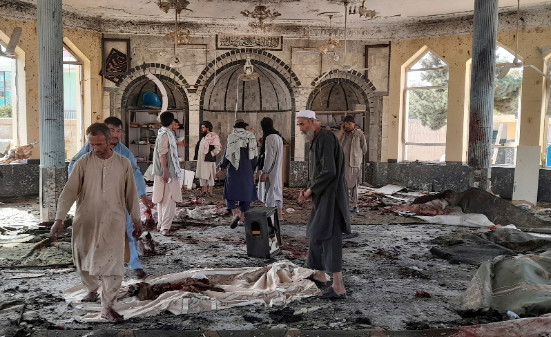Testing times
Tackling the terror unleashed over Shias will be a litmus test for Taliban

It's over two months now since the Taliban took over the reins of Afghanistan following the US' hastened withdrawal, yet, the country is intermittently rocked by suicide bombings — killing hundreds of people. This goes on to display that the Taliban-led government in Kabul is still to find its bearing to contain incidents of terror. However, the most significant and critical development worth noting is that the Shias are singled out in these targeted killings, and perpetrators are the cadres from the Islamic State Khorasan Province (ISIS-K).
It's pertinent here to point out that in around past two weeks, there have been two deadly suicide bombings in Afghanistan, taking the toll well over 100 for Shias. On October 8, a Shia Mosque, Gozar-e-Sayed Abad in Kunduz — where Shias constitute six per cent of the total population — faced a suicide bombing, killing many and injuring more than 50. The suicide bomber, an ISIS(K) terrorist, had sneaked inside the mosque, mingling with the worshippers, and detonated himself causing the loss of lives. Eyewitnesses say it was a grotesque sight with severed limbs and blown away bodies beyond recognition, proving the intensity of the explosion and ferocity of the terror attack. Kunduz has a sizable ethnic population of Hazara Shias as well and several hundred Uzbeks, many of whom also faced casualties inside the mosque.
Deploying the same modus operandi, on October 15, again at a Friday Shia congregation in Kandahar, there were two well-coordinated suicide bombings inside a mosque operating from two entry points, taking a huge toll on the worshippers. Again, ISIS (K) took responsibility for this attack. Two lethal attacks in targeting Shias by the ISIS (K) within weeks suggest that ISIS is posing a tough challenge to the Taliban as its governance seems to be in tatters despite a sworn terrorist of the Haqqani terror network, Sirajuddin Haqqani, being Afghanistan's interior minister. The Taliban government now is a hapless spectator, overlooking the continued Shia target killings. Even the Taliban's mentor, Pakistan-based ISI, which helped in the formation of the government in Kabul, is mute. Crucially, Iran, with a predominantly Shia population, fell short of condemning the Sunni-majority Taliban government for the killings. Perhaps the government in Tehran needs to come out with more vehement rhetoric in criticizing the Taliban for its inability to take on its arch adversary, ISIS, against the singling out of the Shias.
Meanwhile, President Vladimir Putin of Russia, in a video conferencing with the leaders of Commonwealth of Independent States (CIS) on October 15, disclosed, quoting inputs from hard intelligence, that nearly 2000 veterans belonging to the ISIS who had fought in Syria and Iraq are currently amassed on the Russian borders with the CIS countries, posing a real terror threat in the region. He further averred that such ISIS cadres are possibly disguised as refugees, thus making the task of locating them difficult. However, in a strongly worded rebuttal on October 17, the Taliban denied the presence of any IS cadres on Afghan soil. In other words, it offered an open challenge to the Russian President, Putin and his intelligence apparatus.
From these developments, it's more than clear that the Taliban regime is merely repeating its hate rhetoric (as seen during their first spell from 1996-2001) of bringing back amputation of limbs in the interest of security and other regressive measures instead of tackling the ISIS threat. Effectively dealing with its rival is the real litmus test for the Taliban, else it will continue to be drawn towards a gorge of insecurity and uncertainty. Meanwhile, in an Afghanistan-related development, India is likely to host a meeting of National Security Advisors (NSAs) in New Delhi next month to discuss the Afghanistan situation after the Taliban takeover. China and Pakistan are also among the invitees. NSAs of Russia, Tajikistan, Uzbekistan has also been requested to participate in the meet. Pakistan's NSA, Moeed Yusuf has been invited and, if he participates, it will be his first visit to India as Pakistan's NSA. Also, if this happens, it will be a very significant move from the geopolitical and bilateral point of view between India and Pakistan. Earlier, India's NSA, Ajit Doval, and his Pakistani counterpart had attended the Shanghai Cooperation Organization (SCO) meeting in Dushanbe in June this year, but the two didn't discuss bilateral ties at that time. India also participated in the meeting hosted by Russia on October 20. A Taliban delegation attended the meet for the Moscow format talks on Afghanistan. The Moscow talks also included China, Pakistan and Iran.
In the meantime, according to fresh reports, Afghanistan Minister for Interior, Sirajuddin Haqqani, has honoured the families of slain suicide bombers with substantial financial compensation by eulogising their efforts for the cause of religion. This bizarre statement coming from a terrorist who carries a bounty on his head for his complicity with the dreaded Haqqani Network merits condemnation in good measure.
The writer is a retired IPS officer, a security analyst and a former National Security Advisor to the PM of Mauritius. Views expressed are personal



